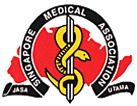
THESMANEWS
Present Issue
Past Issues
Journals
Present Issue
Past
Issues
Letters to the Editor

SERVICE AND TRAINING
Formal postgraduate training, accreditation and continuing medical education are investments by the profession to ensure good standard of healthcare. The reciprocal duties of every doctor to be both teacher and student at every level of the medical hierarchy are time honoured traditions.
These values are best epitomised by the weekly ‘Grand Rounds’ of some hospital departments - weekly rituals in which every doctor of these departments participates. Institutionalised in these ‘Grand Rounds’ are clinical audits, consensus building, bed-side teaching that transcend hierachy and the forging of professional ethos and culture. The commentary in this issue highlights the importance of these rounds in honing the doctors knowledge and skills.
In a free market economy, the efficiency of the healthcare provision is constantly scrutinised to best balance the interests of the doctors, the patients and the bottom line. In response, new processes are introduced to influence outcomes. The inadvertent, though inevitable effects of these measures on training are often overlooked. The effects may be insidious and may affect the stake-holders of training differently.
For example, there are many ramifications on training if patients were allowed to freely self-refer themselves to the highest possible level, as long as charges are paid. To the patient, immediate benefits are realised. There may be more confidence in the treatment and therefore, greater satisfaction. However, to other patients who may be clinically more deserving, but are immediately deprived of the consultant's time (as this is a limited resource), the policy works against them. Also, future generations of patients may lose out because more of the consultant's time is now filled by a plethora of minutiae, leaving less time for training and instructing junior doctors.
Though the senior doctor may be better remunerated, his clinical acumen may be blunted by unchallenging work. The institution achieves its short-term organisational goals. It has however simultaneously undermined its raison d'etre.
Changes to the manner in which healthcare services are funded and delivered
are necessary to ensure that limited healthcare resources are better utilised.
However, conscious attempt
must be made by all concerned to ensure that investment on training is not forgotten, or subjugated to service imperatives.
The issues of training must therefore be carefully explored, bearing in mind the returns-on-investments and the differing time-horizons of each of the different stake holders - the patients, the doctors and the institutions. Society then has the important responsibilities of modulating this web of relationships such that future generations of doctors are optimally trained, and future generations of patients are provided for and protected.
Editorial note: The proposed forum 'Doctors - too many or too few?' as announced in the January issue of the SMJ will be held over to a coming issue.